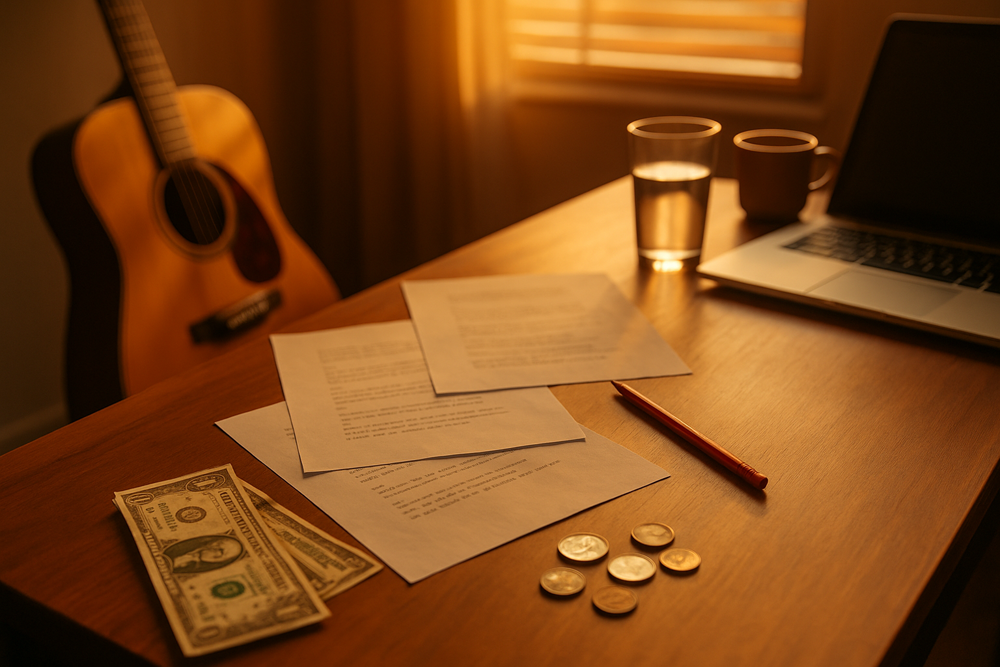The price of a single song copyright keeps rising and can drain your bank account quickly if you write lots of songs. Luckily, there's a trick for legally copyrighting multiple songs at once with the U.S. Copyright Office. Learn how to get a song copyright on a budget!
by CountryDemoStudio Staff | July, 18, 2025.

If you're a songwriter grinding out songs and trying to build your catalog, you've probably looked at the U.S. Copyright Office's ↗🌐 $65-per-song filing fee and thought:" This can get expensive quick." And you're right.
But the biggest mistake you can ever make is not to copyright your songs because of the high fees. Do this instead…
You don't need to file a separate copyright registration for every song right away. There's a smart, budget-friendly way to protect your songs—one that even major publishers like Warner Chappell and PolyGram have used for decades.
Let's talk about registering your songs as a "collection."
The Copyright Office allows you to file multiple unpublished songs together as one registration—called a collection—for a single fee.
The songs in your collection must meet these requirements:
In other words, the exact same co-writers must be on every song. If even one song had a different co-writer, that song can't be included in the collection.
It's a matter of completing the form, and all author names must be the same for all songs.
This method gives you legal copyright protection for every song in the bundle, even if you only paid for one registration.
Big publishers don't pay to register every song the day it's written. Why? Because most songs won't end up getting recorded (cut) or released. Instead, they:
If the pros do it to stay efficient, independent songwriters should too.
Use a collection registration when:
Example: You've written 10 unpublished songs. Instead of spending $650, you register them as a collection and pay just $65.
Just make sure:
When registering a collection of songs, the Copyright Office allows you to include a Title List as part of your application. Here's how:
This method creates a public record that clearly identifies every song covered by the registration, offering stronger protection and easier reference in case of disputes.
If one of your songs gets recorded, released, or placed, you'll want to register it individually later with its own Form PA filing. This gives you:
That's how publishers handle it, and it's a strategy that works just as well for indie creators.
There are a couple of areas to pay attention to when you are filling out Form PA for a new single registration for a song you have previously copyrighted as part of a collection.
Use the original creation date: Write the date on which you wrote the song. (Hopefully, you document dates and details when you write songs for extra protection and proof of your authorship.)
Mention your earlier registration: There is no distinct field for this on the form, so you'll want to include it in the "Note to Copyright Office" field. Add a brief explanation like:
"This work was previously registered as part of a collection under registration number TXu 1-234-567. This filing is for the individual work."
While this is not mandatory, it helps the Copyright Office to understand that this is a new registration for a previously submitted work, now being given its own standalone entry.
While some services promote copyright alternatives, and claim to offer song protection without registration with the Copyright Office, none of them are legally enforceable. Only a copyright officially registered with the U.S. Copyright Office will stand up in court. That means you might be spending money on options that provide little actual protection.
If you can't afford to register a copyright right away, don't leave yourself completely unprotected. Take steps to safeguard your work. Read our article on How to Document Your Song's Creation for Extra Proof of Authorship. While these methods do not replace an official copyright, it provides valuable documentation that every songwriter should establish alongside copyright registration. And such documentation is required to obtain a copyright if you are co-writing with AI.
What you should know about copyright: From a legal standpoint, copyright protection starts as soon as your song is 'fixed'—meaning it's written down, recorded, or otherwise stored in a tangible form you can hear, read, or reproduce. The moment you create an original work, it is automatically copyrighted whether you register it or not. However, to gain the legal benefits of a copyright, you need to register your song.
Copyrighting your music doesn't have to drain your wallet. Registering your songs as a collection provides you with legal coverage and peace of mind, without paying full price for each song. Then, when one of your songs starts gaining traction, you can always go back and file individually.
👉 At Country Demo Studio, we help you create pitch-worthy song demos. And we don't stop there. We're published songwriters too. We'll help you navigate the business side like a pro. From demos to copyrights to publisher pitches, we're here to guide your journey and help in any way we can. Let's get your songs industry-ready. Scroll below to the "Get Started" button to begin your song demo project.
Find the songwriter demo style that fits your budget and your goals.
See Services